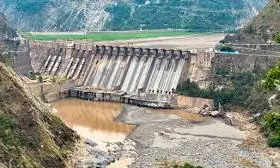
Suspension of Indus Waters Treaty reduces water flow to Pakistan by 17%, disrupts kharif crop sowing
text_fieldsA sharp decline in the flow of water from the Indus River System into Pakistan’s provinces, especially Sindh, has been recorded following India’s suspension of the long-standing Indus Waters Treaty.
This move came in the aftermath of the April 22 terror attack in Pahalgam, Jammu and Kashmir, which left 26 people dead.
According to the latest Daily Water Situation report by Pakistan’s Indus River System Authority (IRSA), water flow into Sindh on June 16 stood at 1.33 lakh cusecs, compared to 1.6 lakh cusecs on the same date last year. This marks a significant 16.87% drop. Punjab province has also witnessed a decline, although more modest, with inflow dropping to 1.26 lakh cusecs from 1.29 lakh cusecs — a 2.25% reduction.
The drop in water availability is proving detrimental to the sowing of Kharif (monsoonal) crops across Pakistan, particularly in the absence of expected monsoon rains, which are still at least two weeks away.
The reduced water levels in rivers and reservoirs linked to the Indus system are placing added stress on farmers and raising concerns of a deepening agricultural crisis.
India’s suspension of the Indus Waters Treaty has also halted the sharing of hydrological data with Pakistan.
This includes crucial updates on river water levels that help Pakistan, a downstream country, prepare for potential flooding. Without access to this information, Pakistan’s flood preparedness is now at risk, especially during the summer melt and upcoming monsoon season.
The Indus Waters Treaty, signed in 1960 and mediated by the World Bank, had survived decades of strained relations between the two neighbours. Under its terms, India was granted exclusive rights over the eastern rivers — Ravi, Beas, and Sutlej — while Pakistan received approximately 135 million acre-feet (MAF) of water from the western rivers — Indus, Jhelum, and Chenab — all of which originate in India and flow into Pakistan.























